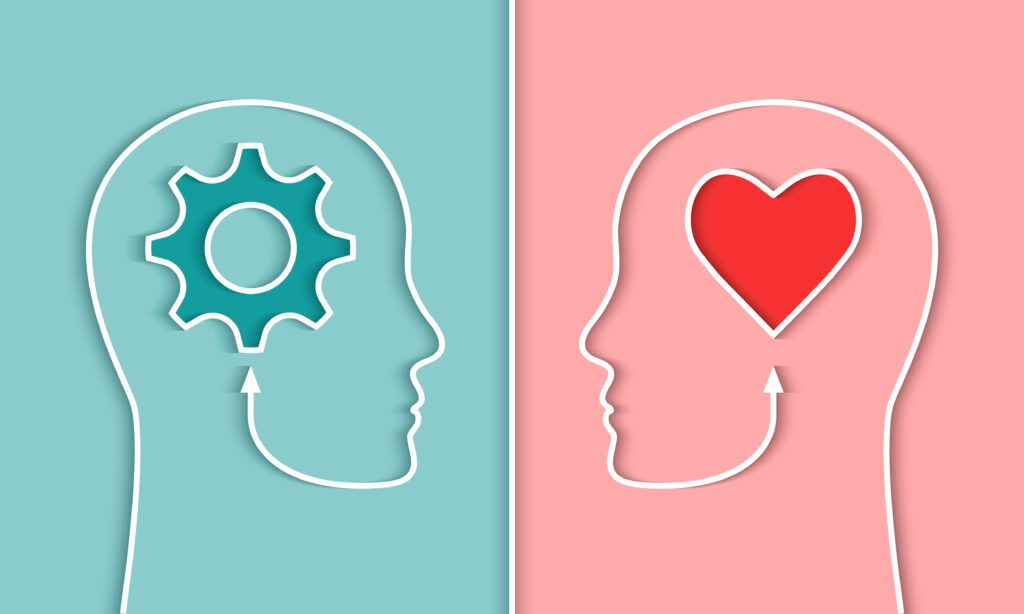By: Shawn English, with ChatGPT (-4.0), Open AI {https://openai.com}
Happiness is a complicated emotion that has long been a subject of study. A vital question in this ongoing discussion is whether emotional intelligence (EQ) or intellectual intelligence (IQ) contributes more to happiness. While IQ refers to cognitive abilities such as logical reasoning, problem-solving, and academic achievement, EQ encompasses skills like emotional awareness, empathy, and interpersonal connections. Both forms of intelligence play significant roles in human lives, yet their contributions to happiness differ substantially. This blog explores the relationship between EQ, IQ, and which one correlates to higher levels of happiness.
Understanding Happiness
Happiness is a subjective emotion, but it could be defined as a state of well-being and contentment. In general, there are two types of happiness: hedonic happiness, which is from pleasure and the absence of pain, and eudaimonic happiness, which is linked to meaning, purpose, and self-realization. Both forms are influenced by factors such as relationships, career satisfaction, and personal growth. Given that happiness is deeply tied to emotional and social experiences, it stands to reason that emotional intelligence might have a larger impact compared to intellectual intelligence.
The Role of High IQ in Happiness
IQ, or intellectual quotient, measures cognitive abilities such as memory, reasoning, and problem-solving. High IQ individuals often excel academically and professionally, leading to better job opportunities, financial stability, and social recognition. These advantages can contribute to happiness by reducing stress and increasing life satisfaction.
However, the relationship between IQ and happiness is not straightforward. While high IQ individuals may achieve career success and material wealth, these external factors do not always translate into emotional well-being. Research shows that individuals with high IQs are prone to overthinking and perfectionism, which can lead to stress, anxiety, and dissatisfaction. Furthermore, high IQ does not necessarily give individuals the emotional skills needed to navigate relationships, cope with adversity, or find meaning in life. As a result, IQ’s contribution to happiness is limited, particularly in the absence of emotional intelligence.
The Power of High EQ in Happiness
Emotional intelligence refers to the ability to recognize, understand, and manage one’s own emotions while also empathizing with and influencing others. High EQ individuals excel in interpersonal relationships, self-awareness, and emotional regulation, which are crucial for both personal and social happiness.
Stronger Relationships
High EQ individuals are adept at understanding and responding to the emotions of others, which helps create deeper connections and trust. Since relationships are a primary source of happiness, EQ plays a pivotal role in well-being. For instance, people with high EQ are more likely to resolve conflicts constructively and maintain healthy, supportive networks.
Resilience and Coping
Emotional intelligence improves resilience, allowing individuals to handle challenges without becoming overwhelmed. High EQ individuals are better equipped to manage stress, adapt to change, and recover from setbacks, all of which contribute to long-term happiness.
Purpose and Meaning
High EQ individuals often possess a heightened sense of self-awareness, enabling them to align their goals and values with their actions. This alignment creates a sense of purpose. By understanding their own emotions and motivations, high EQ individuals are more likely to pursue meaningful activities and relationships.
EQ and IQ: Complementary Strengths
While EQ and IQ are distinct, they are not mutually exclusive. In fact, the most well-rounded and fulfilled individuals often possess a balance of both. For example, a high IQ can provide the cognitive tools to solve complex problems and achieve goals, while a high EQ ensures that these goals are pursued in a way that enhances emotional and relational well-being. When combined, these forms of intelligence complement each other in a way that maximizes happiness.
Consider a leader in a professional setting. A high IQ might help them devise innovative strategies, but a high EQ enables them to inspire their team, resolve conflicts, and foster a positive work environment. Without emotional intelligence, their cognitive brilliance might go unnoticed or, worse, negatively impact others. Similarly, in personal life, a high EQ enhances the ability to enjoy and sustain the benefits of IQ-driven success.
The Limits of High IQ Without EQ
High IQ individuals without corresponding emotional intelligence may struggle to find happiness despite their cognitive gifts. They might excel in intellectual pursuits but face difficulties in managing emotions, building relationships, and finding purpose. For example, an academically brilliant individual might have impressive professional achievements but feel isolated or unfulfilled due to poor interpersonal skills.
Furthermore, high IQ individuals often experience what psychologists call the “paradox of choice,” where their ability to see multiple possibilities leads to overanalyzing decisions and regretting choices. This tendency can diminish life satisfaction and happiness, highlighting the importance of emotional regulation and acceptance—key components of EQ.
High EQ: The Key to Long-Lasting Happiness
In contrast, individuals with high EQ are better equipped to sustain happiness even in the face of challenges. Their ability to connect with others, manage stress, and find meaning in everyday life makes them more resilient and adaptable. Research supports this, showing that emotional intelligence is a stronger predictor of life satisfaction and well-being than IQ. Additionally, the benefits of high EQ extend beyond personal happiness; it also positively impacts communities and organizations by increasing empathy, collaboration, and harmony.
While high IQ can lead to achievements that contribute to happiness, it is high EQ that provides the emotional and relational skills for lasting well-being. Emotional intelligence enables individuals to build strong relationships, cope with challenges, and pursue meaningful goals, all of which are important for happiness. IQ and EQ are complementary strengths, but when it comes to the question of who is happier, usually high EQ has the greater influence. By improving emotional intelligence, individuals can enhance not only their own happiness but also the well-being of those around them, leading to more positivity and fulfillment in the world.




